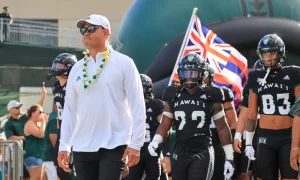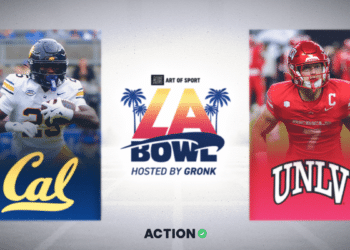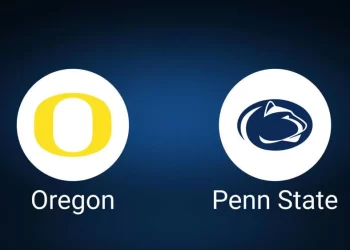By: Brock Vierra
For the University of Hawaii and its loyal football fans, recent times have not been kind. A mass exodus, their historic Aloha Stadium being condemned with its replacement still in limbo, and the uncertainty that comes from a makeshift home field that is below NCAA requirements means that the state of Hawaii football is not looking great. The program also has to deal with various financial shortfalls that gives them a tremendous disadvantage in terms of recruiting. Now with the impending doom of the Pac-12 upon us, the Mountain West (the conference Hawaii plays in) is primed to add some major players.
Now if this happens, Hawaii will find itself in a type of limbo that the program in its current format will find it hard-pressed to escape from. Now there are many downsides to going independent, especially when the majority of independent programs have joined a conference in recent years but for the Warriors, the status quo isn’t cutting it.
A virtual non-factor in the Mountain West, Hawaii has only played in one Mountain West Conference Championship Game since its first season in 2012. Yes, Hawaii benefits from the shared revenue but the lack of nationwide broadcast but a local PPV TV deal that stems from ideology placed in the nineties along with a schedule that they’ll never be able to compete in means Hawaii has little flexibility for growth.
Why Should Hawaii Go Independent?
As an independent, Hawaii can control its schedule and potentially lower some of the taxing travel costs that have plagued the program. Hawaii has longstanding relationships with Mountain West members, especially Nevada and UNLV which benefits all programs as there is a huge Hawaii fan base in Vegas and Reno while both programs can guarantee a trip to Hawaii for its recruits.
Hawaii also has a long history with west coast programs. With USC, UCLA, Oregon, and Washington headed to the Big 10, the expected road trips east will limit their flexibility to travel. A warm climate may just be what they need to fill out their schedules. Alongside USC and UCLA, Hawaii has or will play Fresno State, SDSU, SJSU, Stanford, and Cal so their relationships with the California programs are strong.
Hawaii has also entered an agreement with Sam Houston State so the Texas route is available as well to go along with their history with the state of New Mexico. More importantly, they can negotiate a new TV deal while giving them the ability to be more competitive while expanding their recruiting inroads. Hawaii is in a unique spot because they will always have the last game of the night if they play at home and with legalized gambling nationwide, trust me when I say the degenerate eyes (me) will always be placed on them.
Let’s get real. Programs across the Mountain West have invested a lot of money into their programs while Hawaii continues to have one of the most poorly funded programs in the country. They’re using essentially a high school gym as a weight room, HC Timmy Chang has one of the worst salaries in FBS football and there are zero effective NIL initiatives at work right now. The current way isn’t working and bringing in teams like Washington State and Oregon State are not gonna help.
Hawaii does have a few things going for them. They have a pretty good NFL pipeline history, it’s a safe, peaceful place to live with great weather and they employ an exciting offense that constantly has the ball in the air. The world is changing and Hawaii needs to get ready to change with it. Now this new era of college football may benefit the Warriors but it would be foolish not to look at the other options available to them.
Check out College Football Forecast with Bill Carroll and myself. New episodes are available every week, click here to view our most recent episode with SMU’s Director of Player Personnel Alex Brown.


 NFL
NFL







